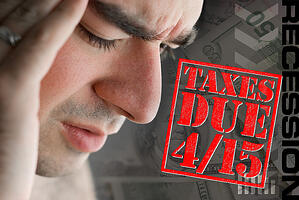 With just under two weeks remaining to file your small business income taxes, last-minute procrastinators are feeling the heat. With great stress and pressure comes the temptation to cut corners. Ann Irons, CPA, a tax preparer in Boston, MA, cautions that the risk is too great, and the penalties are far too high. You still have some time left, albeit very little, but the point is that you have time to prepare your taxes accuratelyand honestly. Better still, there’s even time to take advantage of key deductions and filing options that will maximize your savings.
With just under two weeks remaining to file your small business income taxes, last-minute procrastinators are feeling the heat. With great stress and pressure comes the temptation to cut corners. Ann Irons, CPA, a tax preparer in Boston, MA, cautions that the risk is too great, and the penalties are far too high. You still have some time left, albeit very little, but the point is that you have time to prepare your taxes accuratelyand honestly. Better still, there’s even time to take advantage of key deductions and filing options that will maximize your savings.Employee and Independent Contractor: Know the Difference
If your small business has independent contractors, you can enjoy a substantial tax benefit compared to a company that has only full-time, traditional employees. For each employee, your company must pay payroll taxes to both the state and federal government. These taxes include half of each employee’s Medicare and Social Security payments. If you have an independent contractor, says Irons, your company need not pay these payroll taxes. However, she cautions, you must understand the differences between employees and contractors. A contractor, who usually has his or her own business, has a specific project to complete. Employees are in the direct hire of your business and as such must complete works specifically dictated by a manager or supervisor.
The Section 179 Depreciation Deduction
If you have recently purchased equipment or property, you don’t necessarily have to deduct the value of its annual depreciation. Instead, you can write it all off under Section 179 of the IRS tax code. This could mean huge savings if you’ve made major purchases in the 2013 tax year. For example, you could write off a photocopier, a new vehicle, office furniture, or computers. Irons points out that property must be tangible and should be used at least 51% of the time for business purposes. Although the deduction has been slightly lowered for this year, it still represents a significant savings opportunity for small businesses, especially those that were established in 2013. Before you claim this deduction, consult with your Boston, MA tax preparer to confirm your eligibility.
Last Resort: Filing an Extension
If you absolutely cannot file your completed tax return by the deadline, your best bet is to complete IRS Form 4868 for a six-month extension. It’s not ideal, but it certainly beats filing a return that hasn’t been checked and double-checked to ensure its accuracy. Penalties and audit risks are serious issues that can have disastrous effects for your small business. You needn’t provide a specific reason for requesting an extension, nor must you meet any conditions to qualify. A word of caution, however. Even though you will have more time to file your return, you must still pay your estimated taxes by the April 15th deadline.
Questions about filing your small business tax return in Boston, MA? To learn more about qualifying for deductions or requesting an extension, or to request a consultation with Ann Irons, CPA, LLC, contact our Bellingham, MA office at (508) 966-0700. We provide accounting, bookkeeping, and tax preparation services to individuals and small businesses in and around Boston, Bellingham, and the neighboring communities.






